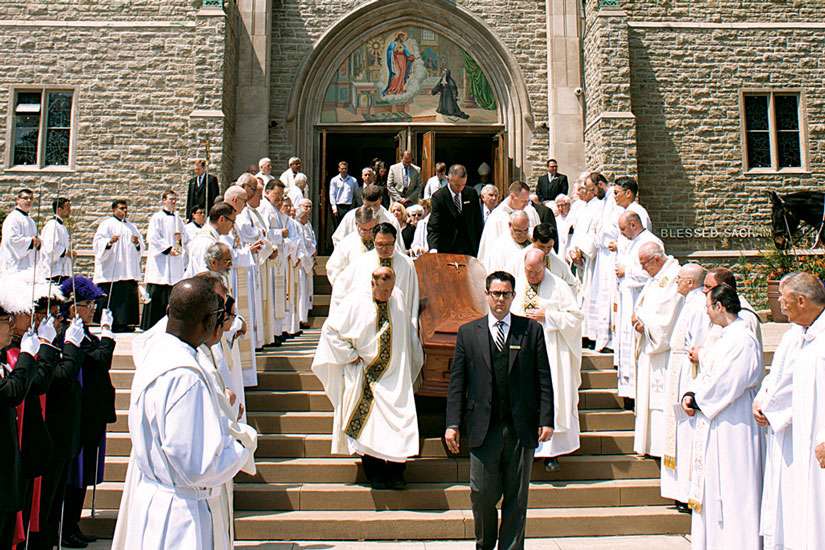“I liked the priests I knew growing up in Midland (Ont.). I liked how they helped me through my teenage years. I also had wonderful parents and a strong Catholic life at home. But I think I was born to be a priest. It’s all I ever wanted,” Msgr. Robitaille told reporter Paul De Courcy in 2002.
On July 2 Msgr. Robitaille died peacefully at Providence Healthcare in his 85th year, 62 of them as a priest.
Msgr. Robitaille was one of a golden generation of Toronto priests when St. Augustine’s Seminary was graduating and ordaining 40 to 50 priests a year.
“He was adamant that he always loved being a priest,” said historian Peter Meehan.
Meehan spent many hours interviewing Msgr. Robitaille while researching an upcoming biography of Toronto Archbishop Philip Pocock. Msgr. Robitaille served as Pocock’s secretary and right hand man through the 1970s as the diocese adjusted to the changes of the Second Vatican Council, launched the diaconate and adapted to new waves of Catholic immigration from around the world.
“He considered it a tragedy that so many left the priesthood during the 1960s and ’70s,” said Meehan in an e-mail. “But he considered himself to have been blessed with a strong priestly identity and vocation — which allowed him to endure these turbulent times.”
While Msgr. Robitaille may have wanted to live out his life as a simple parish priest, others saw his intellectual prowess as a tool the Church had to use.
As soon as he was ordained he was sent to Amos, Que., to teach in the seminary there. From there it was back to St. Augustine’s to teach Latin and three years spent as secretary to Cardinal James McGuigan. He was sent for graduate studies in French at Laval University and came back as professor of French at St. Augustine’s.
He was a senior priest when Pocock chose him to be his day-to-day closest collaborator. In this position, he found himself in almost daily contact with the Ontario premier’s office negotiating one of the most complex and contentious issues of the past half century. Once Premier Bill Davis signalled he was open to talking about full funding for Catholic high schools right through Grade 13, it came down to Msgr. Robitaille to work out the details.
Msgr. Robitaille’s counterpart in the premier’s office in 1983 was a young John Tory, then a principal advisor to Davis and now mayor of Toronto.
“I came away from our discussions feeling I had dealt with a cordial, reasonable man who worked to get a successful outcome for all,” Tory told The Catholic Register in an e-mail. “Which I believe we did.”
At one point Tory found himself surprised by the humble, simple humanity of the man he had only ever referred to as “Monsignor.” On a summer afternoon in 1983, Msgr. Robitaille came knocking on Tory’s office door with the latest proposals from the Ontario bishops. He had slipped by all the secretaries and staff in the premier’s office wearing a hat and sunglasses.
“When I opened the door, there he was,” said Tory. “I didn’t even recognize him with the hat and sunglasses on! He said, ‘It’s me, it’s Ken.’ And I was so accustomed to calling him ‘Monsignor’ I still didn’t get it.”
In the 1970s Msgr. Robitaille finally got his wish to pastor a parish. Not that Sundays preaching at St. Rose of Lima in Scarborough got him out of his other duties working for Pocock and then Cardinal Gerald Emmett Carter and the Ontario Conference of Catholic Bishops (today renamed the Assembly of Catholic Bishops of Ontario).
Christa Gottlob remembers Msgr. Robitaille as the kind and understanding pastor who welcomed her and her family back into the Church in 1977.
“We grew up in Germany at a time when it was a vengeful God, rather than a forgiving and understanding one,” Gottlob said. “He understood and assured me that there is another side to it, that you can be forgiven.”
That was the beginning of a relationship that lasted almost 40 years. When Fr. Robitaille was made a monsignor and then rector of St. Michael’s Cathedral in 1979, the Gottlobs would sneak downtown for Sunday Mass as often as they could.
“When he went to Our Lady of Sorrows (in 1994), we did the same,” she said.
For Fr. Joshua Roldan, ordained in 2013 and now associate pastor at Our Lady of Grace parish in Aurora, Msgr. Robitaille’s wisdom and example are still alive. As a seminarian, Robitaille helped Roldan make sense of his call to priesthood.
“Many times I was trying to figure out why, what’s this call about,” recalled Roldan. “And not understanding it.”
Just before ordination, Roldan went through a not-uncommon moment of hesitation.
“At one point when I was getting ready for ordination I was afraid, I was scared, I was anxious,” he said. At that moment Roldan received a letter from the octogenarian priest.
“As long as you love the people and you love God, that’s the one thing you have to do as a priest. And that’s how to be a good priest,” Msgr. Robitaille wrote.


